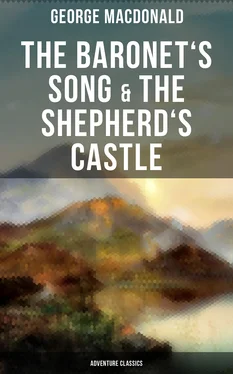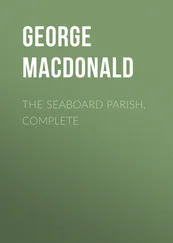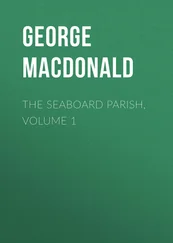When Robert became aware, chiefly through the representations of his wife and Donal, of Gibbie's gifts of other kinds than those revealed to himself by his good shepherding, he began to turn it over in his mind, and by and by referred the question to his wife whether they ought not to send the boy to school, that he might learn the things he was so much more than ordinarily capable of learning. Janet would give no immediate opinion. She must think, she said; and she took three days to turn the matter over in her mind. Her questioning cogitation was to this effect: "What need has a man to know anything but what the New Testament teaches him? Life was little to me before I began to understand its good news; now it is more than good—it is grand. But then, man is to live by every word that proceedeth out of the mouth of God; and everything came out of his mouth, when he said, Let there be this, and Let there be that. Whatever is true is his making, and the more we know of it the better. Besides, how much less of the New Testament would I understand now, if it were not for things I had gone through and learned before!"
"Ay, Robert," she answered, without preface, the third day, "I'm thinkin' there's a heap o' things, gien I hed them, 'at wad help me to ken what the Maister spak till. It wad be a sin no to lat the laddie learn. But wha'll tak the trible needfu' to the learnin' o' a puir dummie?"
"Lat him gang doon to the Mains, an' herd wi' Donal," answered Robert. "He kens a hantle mair nor you or me or Gibbie aither; an' whan he's learnt a' 'at Donal can shaw him it'll be time to think what neist."
"Weel," answered Janet, "nane can say but that's sense, Robert; an' though I'm laith, for your sake mair nor my ain, to lat the laddie gang, let him gang to Donal. I houp, atween the twa, they winna lat the nowt amo' the corn."
"The corn's 'maist cuttit noo," replied Robert; "an' for the maitter o' that, twa guid consciences winna blaw ane anither oot.—But he needna gang ilka day. He can gie ae day to the learnin', an' the neist to thinkin' aboot it amo' the sheep. An' ony day 'at ye want to keep him, ye can keep him; for it winna be as gien he gaed to the schuil."
Gibbie was delighted with the proposal.
"Only," said Robert, in final warning, "dinna ye lat them tak ye, Gibbie, an' score yer back again, my cratur; an' dinna ye answer naebody, whan they speir what ye're ca'd, onything mair nor jist Gibbie."
The boy laughed and nodded, and, as Janet said, the bairn's nick was guid 's the best man's word.
Now came a happy time for the two boys. Donal began at once to teach Gibbie Euclid and arithmetic. When they had had enough of that for a day, he read Scotish history to him; and when they had done what seemed their duty by that, then came the best of the feast—whatever tales or poetry Donal had laid his hands upon.
Somewhere about this time it was that he first got hold of a copy of the Paradise Lost. He found that he could not make much of it. But he found also that, as before with the ballads, when he read from it aloud to Gibbie, his mere listening presence sent back a spiritual echo that helped him to the meaning; and when neither of them understood it, the grand organ roll of it, losing nothing in the Scotch voweling, delighted them both.
Once they were startled by seeing the gamekeeper enter the field. The moment he saw him, Gibbie laid himself flat on the ground, but ready to spring to his feet and run. The man, however, did not come near them.
CHAPTER XXVI.
THE GAMEKEEPER
Table of Contents
The second winter came, and with the first frost Gibbie resumed his sheepskin coat and the brogues and leggings which he had made for himself of deer-hide tanned with the hair. It pleased the two old people to see him so warmly clad. It pleased them also that, thus dressed, he always reminded them of some sacred personage undetermined—Jacob, or John the Baptist, or the man who went to meet the lion and be killed by him—in Robert's big Bible, that is, in one or other of the woodcuts of the same. Very soon the stories about him were all stirred up afresh, and new rumours added. This one and that of the children declared they had caught sight of the beast-loon, running about the rocks like a goat; and one day a boy of Angus's own, who had been a good way up the mountain, came home nearly dead with terror, saying the beast-loon had chased him a long way. He did not add that he had been throwing stones at the sheep, not perceiving any one in charge of them. So, one fine morning in December, having nothing particular to attend to, Angus shouldered his double-barrelled gun, and set out for a walk over Glashgar, in the hope of coming upon the savage that terrified the children. He must be off. That was settled. Where Angus was in authority, the outlandish was not to be suffered. The sun shone bright, and a keen wind was blowing.
About noon he came in sight of a few sheep, in a sheltered spot, where were little patches of coarse grass among the heather. On a stone, a few yards above them, sat Gibbie, not reading, as he would be half the time now, but busied with a Pan's-pipes—which, under Donal's direction, he had made for himself—drawing from them experimental sounds, and feeling after the possibility of a melody. He was so much occupied that he did not see Angus approach, who now stood for a moment or two regarding him. He was hirsute as Esau, his head crowned with its own plentiful crop—even in winter he wore no cap—his body covered with the wool of the sheep, and his legs and feet with the hide of the deer—the hair, as in nature, outward. The deer-skin Angus knew for what it was from afar, and concluding it the spoil of the only crime of which he recognized the enormity, whereas it was in truth part of a skin he had himself sold to a saddler in the next village, to make sporrans of, boiled over with wrath, and strode nearer, grinding his teeth. Gibbie looked up, knew him, and starting to his feet, turned to the hill. Angus, levelling his gun, shouted to him to stop, but Gibbie only ran the harder, nor once looked round. Idiotic with rage, Angus fired. One of his barrels was loaded with shot, the other with ball: meaning to use the shot barrel, he pulled the wrong trigger, and liberated the bullet. It went through the calf of Gibbie's right leg, and he fell. It had, however, passed between two muscles without injuring either greatly, and had severed no artery. The next moment he was on his feet again and running, nor did he yet feel pain. Happily he was not very far from home, and he made for it as fast as he could—preceded by Oscar, who, having once by accident been shot himself, had a mortal terror of guns. Maimed as Gibbie was, he could yet run a good deal faster up hill than the rascal who followed him. But long before he reached the cottage, the pain had arrived, and the nearer he got to it the worse it grew. In spite of the anguish, however, he held on with determination; to be seized by Angus and dragged down to Glashruach, would be far worse.
Robert Grant was at home that day, suffering from rheumatism. He was seated in the ingle-neuk, with his pipe in his mouth, and Janet was just taking the potatoes for their dinner off the fire, when the door flew open, and in stumbled Gibbie, and fell on the floor. The old man threw his pipe from him, and rose trembling, but Janet was before him. She dropt down on her knees beside the boy, and put her arm under his head. He was white and motionless.
"Eh, Robert Grant!" she cried, "he's bleedin'."
The same moment they heard quick yet heavy steps approaching. At once Robert divined the truth, and a great wrath banished rheumatism and age together. Like a boy he sprang to the crap o' the wa', whence his yet powerful hand came back armed with a huge rusty old broad-sword that had seen service in its day. Two or three fierce tugs at the hilt proving the blade immovable in the sheath, and the steps being now almost at the door, he clubbed the weapon, grasping it by the sheathed blade, and holding it with the edge downward, so that the blow he meant to deal should fall from the round of the basket hilt. As he heaved it aloft, the gray old shepherd seemed inspired by the god of battles; the rage of a hundred ancestors was welling up in his peaceful breast. His red eye flashed, and the few hairs that were left him stood erect on his head like the mane of a roused lion. Ere Angus had his second foot over the threshold, down came the helmet-like hilt with a dull crash on his head, and he staggered against the wall.
Читать дальше












